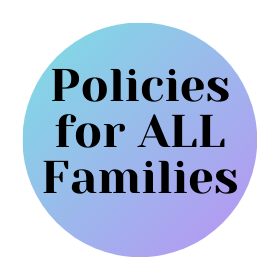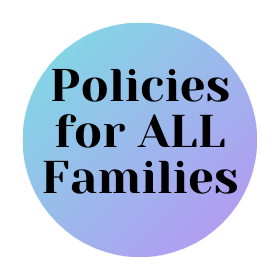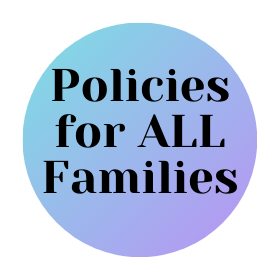About the Marshall Plan for Moms
Spearheaded by Reshma Saujani, founded of Girls Who Code, the Marshall Plan for Mom describes itself:
“In January, 50 prominent women called on the Biden Administration to implement a Marshall Plan for Moms, a bold 360-plan to provide direct payments to moms and pass long overdue policies addressing paid family leave, affordable childcare, and pay equity.
The letter was signed by celebrities, business leaders, and activists including Amy Schumer, Alexis McGill Johnson, Julianne Moore, Tarana Burke, Whitney Wolfe Herd, Ai-Jen Poo, Charlize Theron, Eva Longoria, Gabrielle Union, Ana Ortiz, and more.”
This effort was well-funded. They announced the call for a Marshall Plan for Moms with a full-page ad in the New York Times (cost: over $100,000). They also bought a full-page ad in the Washington Post, publishing a letter of support signed by 50 prominent men.
On February 11, 2021, a Resolution was introduced in the House of Representatives: Recognizing that the United States needs a Marshall Plan for Moms in order to revitalize and restore mothers in the workforce.
Sponsor: Rep. Grace Meng (D-NY-6); Co-sponsored by 34 Representatives
Summary from Congress.gov: H.Res.121 — 117th Congress (2021-2022)
This resolution declares that (1) the United States needs a Marshall Plan for Moms to revitalize and restore mothers in the workforce; and (2) mothers, especially mothers of color have been pushed to the brink of economic, social, and emotional collapse during the COVID-19 (i.e., coronavirus disease 2019) pandemic because of the existing economic and social inequalities women have long faced.
The resolution also states that any relief and long-term recovery package to address the COVID-19 crisis must recognize and rebuild moms in the workforce by including certain policies such as
- establishing a robust paid leave plan;
- rebuilding and stabilizing the child care industry;
- providing necessary child poverty reduction tools for families’ economic security that include recurring child benefits and an expanded and improved child tax credit and earned income tax credit;
- establishing an expanded unemployment insurance program that benefits struggling workers, including those experiencing long-term unemployment;
- raising the federal minimum wage to $15 per hour or higher for all minimum wage workers; and
- providing access to mental health support for mothers.
Finally, the resolution declares that U.S. employers and policymakers must prioritize addressing the economic cliff facing mothers and make permanent the policies of this resolution so that mothers are protected against any future economic calamities.
Family and Home Network concerns about the Marshall Plan for Moms:
This resolution discriminates by addressing the impact of caregiving only on mothers’ employment -ignoring fathers and caregiving grandparents (parents are not available).
The resolution discriminates by calling for family policies that benefit only employed parents rather than inclusive family policies made without regard for parents’ participation in the paid workforce.
The bill uses the pandemic crisis of care – much of which was due to school closures – to call for permanent increases in funding and infrastructure for some kinds of care – child care services, without equitable funding for care provided by parents in other ways, including parents doing the caregiving themselves, tag-team parenting in which parents work different hours and provide all or most of the care, care provided by grandparents.
The bill fails to recognize the diversity of families raising children, the preferences of parents, as shown in many reliable studies.
All parents need support when they have a newborn or newly-adopted child; parental leave tied to the paid workforce discriminates by failing to offer support to millions of parents, including those who are students, those who are out of the paid workforce, those who are self-employed or entrepreneurs. Matt Bruenig of the People’s Policy Project proposes several inclusive policies, here is his parental leave:
“Parental Leave. Families will receive 36 weeks of paid leave for the birth of a child. In single-parent families, the sole parent is entitled to all 36 weeks. In two-parent families, each parent is entitled to 18 weeks but may transfer up to 14 weeks to the other parent. The paid leave benefit will be set equal to 100 percent of earnings up to the minimum wage and 66 percent of earnings beyond the minimum wage. All recipients will be entitled to benefits equal to at least the minimum wage but no more than the national average wage.”
All parents provide care for their children; we need policies that support ALL care for children.



